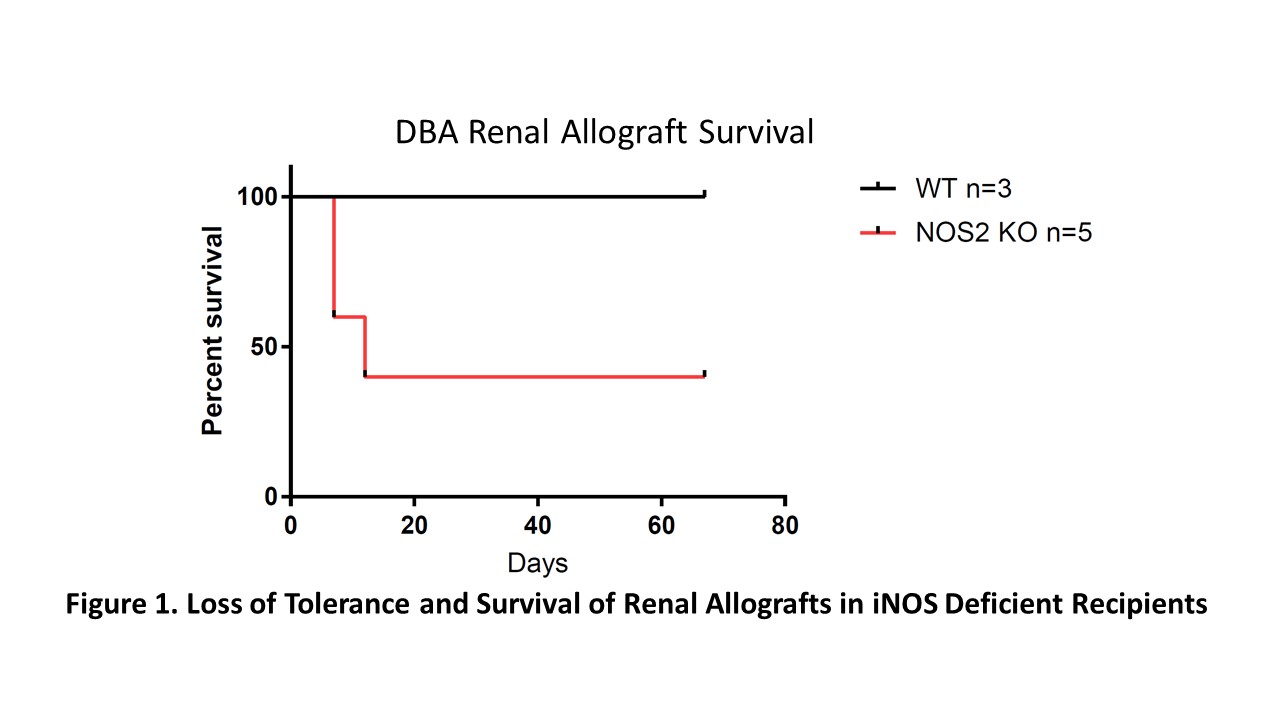Recipient iNOS Deficiency Reduces Spontaneous Kidney Allograft Acceptance by Accelerating Allograft Loss.
Center for Transplantation Sciences, Massachusetts General Hospital, Boston, MA
Meeting: 2017 American Transplant Congress
Abstract number: B18
Keywords: Graft survival, knockout, Mice, Nitric oxide, Tolerance
Session Information
Session Name: Poster Session B: Acute and Chronic Rejection
Session Type: Poster Session
Date: Sunday, April 30, 2017
Session Time: 6:00pm-7:00pm
 Presentation Time: 6:00pm-7:00pm
Presentation Time: 6:00pm-7:00pm
Location: Hall D1
Nitric oxide (NO) production by inducible nitric oxide synthase (iNOS), encoded by NOS2, is a hallmark of the innate immune axis, and is typically associated with proinflammatory activity. However, the discovery of nitric oxide's pleiotropic effects on a myriad of biological targets now suggests an additional role in regulating lymphocyte activity by inhibiting cytotoxic T lymphocyte (CTL) migration. Jevnikar et al. showed that recipients of donor renal allografts deficient in iNOS caused accelerated rejection of the kidney. Although the function of NO in tumor evasion has been explored, the protective properties of recipient NO in solid organ transplantation are still unclear. In the past, we have shown that accepted allografts are characterized by widespread nitrosylation, while rejecting cohorts display significantly reduced levels. The aim of this study is to determine the role of recipient NOS2 in renal allograft tolerance. A spontaneous allograft acceptance model was employed to observe a normal immune response without immunosuppression. DBA/2 kidneys were transplanted into either wild-type or NOS2-/- B6 mice. Graft survival was monitored by measuring blood urea nitrogen (BUN) levels. The survival rate of DBA kidney allograft in wild-type B6 mice was 100% and 40% in animals deficient in NOS2. This data suggests a role of recipient NO production in promoting spontaneous kidney allograft acceptance. We are currently studying what cell type(s) contribute to the observed nitrosylation and quantifying the level of CTLs and regulatory T cells (Treg) that localize to the allograft. 
CITATION INFORMATION: Aljabban I, Jiang B, Yang C, Ndishabandi D, White R, Russell P, Madsen J, Colvin R, Alessandrini A. Recipient iNOS Deficiency Reduces Spontaneous Kidney Allograft Acceptance by Accelerating Allograft Loss. Am J Transplant. 2017;17 (suppl 3).
To cite this abstract in AMA style:
Aljabban I, Jiang B, Yang C, Ndishabandi D, White R, Russell P, Madsen J, Colvin R, Alessandrini A. Recipient iNOS Deficiency Reduces Spontaneous Kidney Allograft Acceptance by Accelerating Allograft Loss. [abstract]. Am J Transplant. 2017; 17 (suppl 3). https://atcmeetingabstracts.com/abstract/recipient-inos-deficiency-reduces-spontaneous-kidney-allograft-acceptance-by-accelerating-allograft-loss/. Accessed February 16, 2026.« Back to 2017 American Transplant Congress
